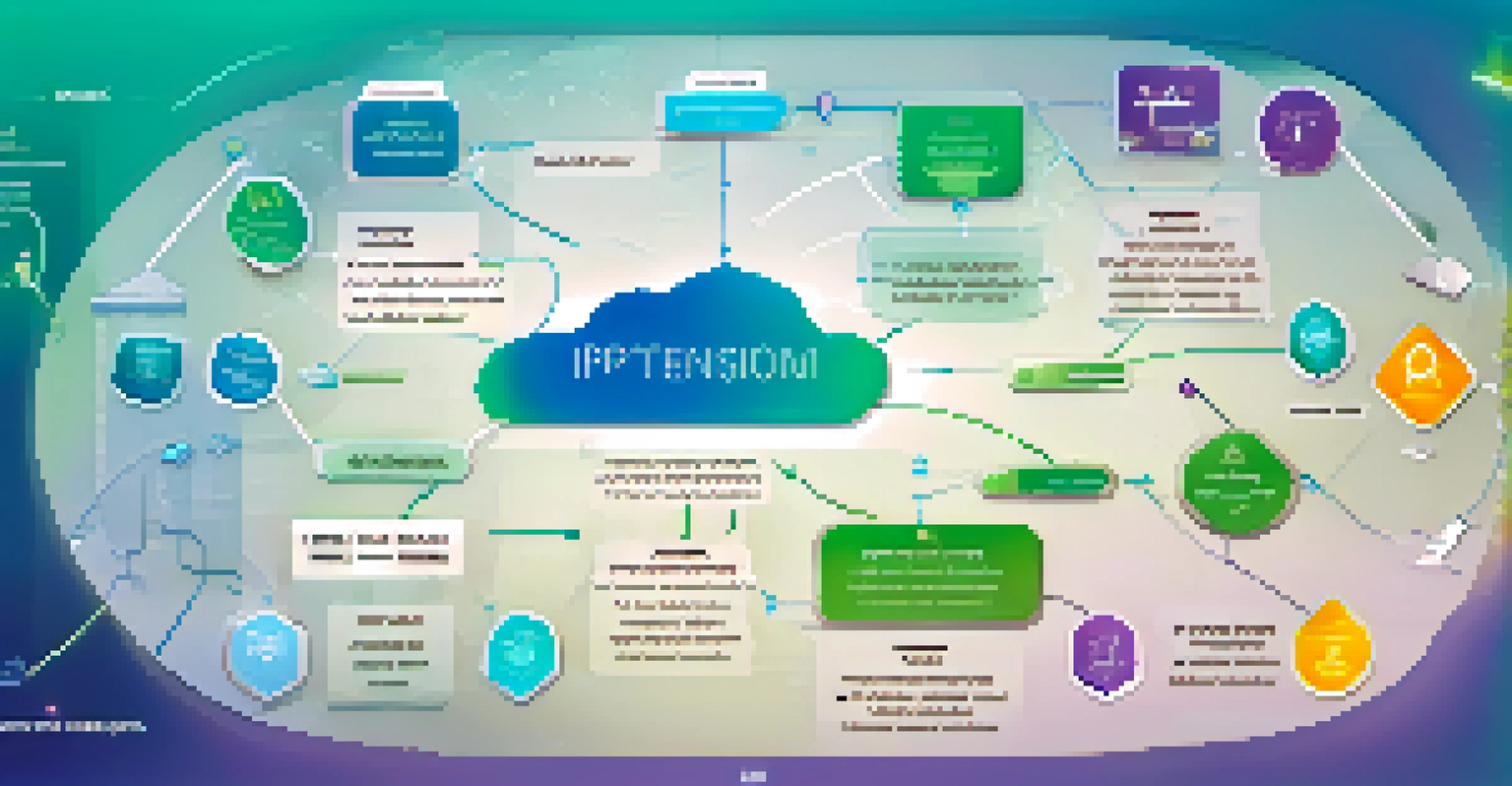How Ethereum's Smart Contracts Aid IP Tokenization Efforts

Understanding IP Tokenization and Its Importance
Intellectual property (IP) tokenization refers to the process of converting rights to an asset into a digital token on a blockchain. This process can simplify the ownership and transfer of IP rights, making them more accessible and tradable. Imagine owning a piece of art; tokenization allows you to buy, sell, or trade your stake easily, similar to trading stocks.
Intellectual property is like a tree; it grows over time, and if you don't protect it, it can be cut down.
In today's digital age, creators often struggle to protect their work from unauthorized use. By tokenizing their IP rights, they gain more control and visibility over their creations. This shift not only empowers creators but also opens new revenue streams that were previously difficult to access.
As we delve deeper into the role of Ethereum's smart contracts, it becomes clear how they provide the necessary framework for effective IP tokenization. Their ability to automate and enforce agreements ensures that creators receive fair compensation while maintaining their rights.
How Ethereum's Smart Contracts Work
At its core, Ethereum is a decentralized platform that allows developers to create smart contracts. These self-executing contracts automatically enforce the terms of an agreement between parties, removing the need for intermediaries. Think of them as digital vending machines; once you input the right amount, they deliver the product without any fuss.

Smart contracts function on the principles of transparency and security. Because they reside on the blockchain, every transaction is recorded and can be audited, ensuring that all parties adhere to the agreed-upon terms. This level of trust is essential when dealing with IP, where disputes over ownership can be common.
IP Tokenization Simplifies Ownership
Tokenization allows creators to easily buy, sell, or trade their intellectual property rights, making them more accessible.
For instance, if an artist sells a token representing their work, a smart contract ensures that the artist receives royalties whenever that token is sold again. This automated process not only protects the artist's interests but also builds a more equitable ecosystem for creators.
Benefits of Using Ethereum for IP Tokenization
Utilizing Ethereum for IP tokenization brings forth a multitude of benefits. One significant advantage is the reduction of costs associated with traditional IP management. By eliminating intermediaries, creators can save time and money, allowing them to focus more on their craft rather than legal paperwork.
The future belongs to those who believe in the beauty of their dreams, and with blockchain, those dreams can become reality.
Moreover, Ethereum's global reach means that creators can showcase their work to a wider audience. An artist in one part of the world can easily sell their tokenized IP to a buyer on the other side of the globe, all thanks to the decentralized nature of the blockchain. This opens up exciting new markets and opportunities.
Additionally, the use of Ethereum fosters innovation in how IP can be monetized. Creators can experiment with new business models, such as fractional ownership or crowdfunding through token sales, which can lead to more diverse revenue streams.
Challenges in IP Tokenization on Ethereum
While the benefits of Ethereum's smart contracts in IP tokenization are clear, there are challenges to consider. One major hurdle is the complexity of existing IP laws, which vary significantly across jurisdictions. Navigating these legal landscapes can be daunting for creators looking to tokenize their work.
Another challenge is the issue of scalability. As more users flock to Ethereum, the network can become congested, leading to slower transaction times and higher fees. This can be particularly problematic for creators on tight budgets or timelines.
Ethereum Enhances IP Protection
Smart contracts on Ethereum automate agreements, ensuring creators receive fair compensation and maintain control over their work.
Lastly, there is a learning curve associated with blockchain technology. Many creators may not fully understand how to navigate the Ethereum ecosystem, which could hinder their ability to effectively tokenize their IP. Education and resources are essential to bridge this gap.
Real-World Examples of IP Tokenization on Ethereum
Several projects have successfully harnessed Ethereum's smart contracts for IP tokenization. One notable example is Async Art, a platform that allows artists to create programmable art pieces. Each layer of an artwork can be owned by different individuals, giving collectors unique pieces that can evolve over time.
Another example is the platform Mintbase, which enables users to mint and sell NFTs (non-fungible tokens) representing their IP rights. This platform has empowered musicians, authors, and visual artists to tokenize their work and engage directly with their audience.
These real-world applications illustrate the potential of Ethereum's smart contracts in revolutionizing IP tokenization. As more creators explore these avenues, we can expect to see a growing ecosystem of tokenized IP assets.
The Future of IP Tokenization with Ethereum
Looking ahead, the future of IP tokenization on Ethereum appears promising. As the technology matures, we can anticipate improvements in scalability and user experience, making it easier for creators to tokenize their work. Innovations like Ethereum 2.0 aim to address current limitations, paving the way for a more efficient network.
Moreover, as awareness around IP tokenization grows, we may see more industries adopting these practices. From music and film to literature and art, the potential for tokenized IP is vast and can transform how creators monetize their work.
Challenges in Tokenizing IP
Navigating complex IP laws and scalability issues on Ethereum presents significant challenges for creators looking to tokenize their work.
Ultimately, the combination of Ethereum's smart contracts and the evolving landscape of IP rights presents an exciting opportunity for creators. With continued advancements, we may soon witness a more equitable and accessible environment for intellectual property.
Getting Started with IP Tokenization on Ethereum
For creators interested in exploring IP tokenization, starting on Ethereum can feel overwhelming. However, there are numerous resources available to help guide you through the process. Platforms like OpenSea and Rarible offer user-friendly interfaces for minting NFTs, making it accessible even for those without technical expertise.
Before diving in, it's essential to understand your rights and the implications of tokenizing your work. Consulting with legal professionals who specialize in IP can provide clarity and ensure that you’re protecting your interests while leveraging the benefits of tokenization.

Lastly, connecting with communities in the blockchain space can provide support and insights. Engaging with other creators can foster collaboration and spark innovative ideas for how to best utilize Ethereum for your IP tokenization efforts.